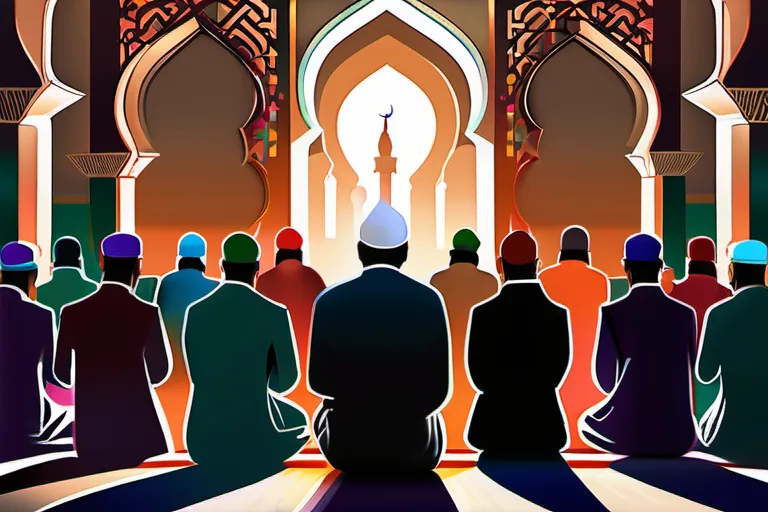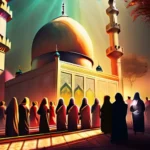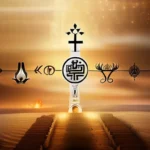Exploring the Demographic Shifts, Cultural Significance, and Socio-Political Implications of the Rapidly Expanding Muslim Population
In today’s globalized world, understanding the fastest growing religion is crucial for fostering intercultural dialogue and promoting harmony. This article delves into the reasons behind Islam’s rapid growth and its profound impact on contemporary society.
The Demographic Shifts Driving Islam’s Growth
Why is Islam the fastest growing religion in 2022, and what does this mean for today’s society? The answer lies in several demographic shifts that are reshaping our global landscape. Have you ever stopped to consider how birth rates play a role in religious growth? In many Muslim-majority countries, high fertility rates have contributed significantly to the expansion of the Muslim population. Think of it as a wave, growing stronger with each passing year. These high birth rates are not just numbers on a chart; they represent vibrant communities and cultures that are thriving and expanding.
Migration patterns also contribute to this growth. As people from Muslim-majority countries move to other parts of the world for education, work, or better living conditions, they often bring their faith with them. This demographic tide is sweeping across continents, bringing Islam into new territories and cultures. Countries like Germany, France, and the United States are experiencing a surge in their Muslim populations due to immigration, leading to a more diverse religious landscape.
A third factor that cannot be overlooked is conversion. Many individuals around the world are discovering Islam through personal experiences or deep spiritual inquiries. The message of peace and unity resonates with those seeking meaning and purpose. Converts add new layers to the rich tapestry of Islamic practice, bringing unique perspectives and practices into their communities.
The impact of these demographic shifts is profound. They challenge us to rethink our understanding of religion in a global context. As more people embrace Islam, it becomes an increasingly visible part of society, influencing everything from political discourse to cultural expressions. The question now is: how will we engage with this growth and what opportunities does it present for building bridges and fostering understanding between different communities?
Islam’s Cultural Significance in Today’s World
Why is Islam the Fastest Growing Religion in 2022 and Its Impact on Today’s Society? Is it just about numbers, or does it hold deeper cultural significance?
When we talk about the cultural aspects of Islam, one cannot help but marvel at its profound influence. Just like a vibrant garden, Islamic art, literature, music, and cuisine have flourished over centuries, enriching global culture in countless ways.
Art: The intricate patterns and geometric designs found in Islamic art are not just aesthetically pleasing; they symbolize the infinite nature of God. Can you imagine a world without these beautiful, complex motifs that adorn mosques and traditional buildings?
Literature: From the poetic verses of Rumi to the philosophical musings of Al-Ghazali, Islamic literature has left an indelible mark on human thought. How would our understanding of spirituality and ethics be different without these profound writings?
Music: Sufi music, with its spiritual melodies and rhythms, encourages a deep connection to the divine. Doesn’t it add a layer of depth to your experience when you hear traditional Islamic music during worship or festivals?
Cuisine: The diverse culinary traditions within Islam reflect the religion’s global spread and interactions with various cultures. From the spicy curries of South Asia to the savory kebabs of the Middle East, these dishes tell stories of migration and cultural exchange. How would our taste buds fare without this rich tapestry of flavors?
The integration of these cultural elements into everyday life is a testament to Islam’s adaptability and resilience. As the Muslim population continues to grow, these cultural aspects will undoubtedly play a significant role in shaping global identities and interactions. The question remains: how will we appreciate and incorporate this rich heritage in our modern societies?
The Socio-Political Implications of Islam’s Growth
Why is Islam the fastest growing religion in 2022, and what does this mean for today’s society? It’s like asking why a wildfire spreads faster than a forest can regrow—there are multiple factors at play. In politics, the increasing Muslim population means more seats at the table. Are we ready to embrace diversity in leadership or will we face challenges in integration and representation? In economics, the growth of Islamic finance is reshaping global markets. How will this shift affect traditional banking and investment strategies? And what about social structures? Will the family values and community support systems inherent in many Muslim cultures lead to stronger societal bonds, or could they create tensions with more individualistic societies? These questions are not just academic; they shape our future in profound ways. As the number of Muslims continues to grow, so too does their influence on the socio-political landscape. The challenge lies in understanding and adapting to this change, ensuring that everyone’s voice is heard and valued.
Islam in the Digital Age: Online Communities and Social Media
Why is Islam the Fastest Growing Religion in 2022 and Its Impact on Today’s Society? The internet and social media have played a pivotal role in this growth, transforming the way Muslims connect, share ideas, and practice their faith. Imagine a vast digital landscape where believers from diverse backgrounds come together, breaking down physical barriers and fostering a sense of unity. How has this shift impacted our understanding of Islam?
The rise of online communities has created a space where individuals can explore their faith without the constraints of traditional religious institutions. These platforms serve as virtual mosques, where people can seek guidance, participate in discussions, and even attend religious services virtually. It’s like having a global congregation at your fingertips, making religion more accessible than ever before.
The impact on social media is equally profound. Through hashtags and posts, Muslims are not only sharing their beliefs but also addressing contemporary issues. For instance, how do social media campaigns tackle the challenges of radicalization? Are these platforms effective in promoting peace and tolerance within the Muslim community?
Moreover, the influence of digital tools extends to education. Online courses and webinars are making Islamic studies more approachable for a wider audience. This democratization of knowledge is crucial, as it allows individuals from different walks of life to deepen their understanding and practice of Islam. However, what about the quality of this information? Are online resources reliable, or do they sometimes propagate misinformation?
The growth of these digital communities has also led to new forms of interaction. Muslims are engaging with each other across continents, breaking down stereotypes, and fostering a sense of global community. But how does this interconnectivity shape their identity? Does it enhance or dilute traditional cultural practices?
As we explore these questions, one thing is clear: the digital age has revolutionized the way Islam is practiced and perceived in today’s society. It’s reshaping not just religious practice but also socio-political landscapes, challenging us to rethink our definitions of community and belief in an increasingly connected world.
The Role of Education in Promoting Understanding of Islam
The role of education in promoting mutual understanding between Muslims and non-Muslims cannot be overstated. In today’s interconnected world, where cultures intertwine like strands of a rope, it becomes imperative to foster a deep, meaningful comprehension that goes beyond superficial exchanges.
Imagine a classroom where students from diverse backgrounds come together, each bringing their unique perspectives and experiences. How can we bridge the gap between these worlds? Through education! By integrating Islamic studies into curricula worldwide, educators have the power to dispel myths and misconceptions, revealing the rich tapestry of Muslim culture and its profound influence on society.
Initiatives such as the Dialogue of Civilizations program are pivotal. This initiative brings together scholars from various disciplines to explore the historical and contemporary interactions between different civilizations, highlighting the shared human values that transcend religious boundaries. By delving into these discussions, students learn to appreciate the complexities and nuances of Islamic thought.
The Interfaith Dialogue Institute, another groundbreaking effort, provides a platform for young people from diverse faiths to engage in meaningful conversations. Through workshops, seminars, and cultural exchanges, participants are encouraged to share their stories and explore common ground. These experiences can be transformative, fostering a sense of unity and respect that is crucial in today’s polarized world.
Moreover, the rise of online platforms has made intercultural dialogue more accessible than ever before. Virtual classrooms, webinars, and interactive forums allow individuals from different parts of the globe to connect and learn from each other without geographical constraints. This digital transformation opens up endless possibilities for education and understanding, breaking down barriers that once seemed insurmountable.
As we navigate an increasingly complex world, the importance of educating ourselves about Islam cannot be understated. Through comprehensive educational initiatives, we can build bridges of understanding that not only benefit Muslims but also enrich the fabric of our global society. The future lies in our ability to embrace diversity and find common ground in our shared humanity.
Islam’s Contribution to Science, Technology, and Innovation
Imagine a vast tapestry, woven with threads of knowledge and innovation, where Islam stands out as the vibrant color that seems to deepen with each passing year. In 2022, it’s not just about numbers; it’s about ideas, inventions, and interpretations that are reshaping our world. How did Islam become the fastest-growing religion, and what does this mean for today’s society? Let’s dive into a fascinating story of science, technology, and innovation that spans centuries.
The contributions of Muslim scholars during the Golden Age of Islam, from the 8th to the 14th century, were nothing short of revolutionary. Think about it: could we even have calculus without the work of figures like Ibn al-Haytham, who studied optics and laid foundational principles for modern physics? Or imagine a world where the Qibla (direction towards the Kaaba) was not just a spiritual guide but also an early form of navigation, helping traders and explorers chart new courses across vast oceans.
Astronomy, too, saw immense advancements. The work of scholars like Al-Biruni and Ibn al-Shatir contributed to the understanding of celestial bodies that influenced both scientific thought and religious practice. Their efforts not only pushed the boundaries of astronomy but also played a crucial role in calendering systems, which impact social and cultural calendars worldwide.
In medicine, the contributions are equally profound. The Clinics established by Muslim scholars were advanced for their time, offering free healthcare to all, regardless of faith or status. Figures like Averroes and Avicenna, whose works laid down comprehensive medical texts still studied today, transformed the practice of medicine and influenced Western physicians centuries later.
The relevance of these contributions in today’s world is undeniable. From algorithms that drive modern technology to advances in medical research, the seeds sown by Muslim scholars continue to bear fruit. In an era where global cooperation is paramount, understanding the historical context and ongoing impact of Islamic contributions can foster mutual respect and collaboration among diverse communities.
Conclusion
 By gaining insights into the unique aspects of Islam and its role in shaping today’s world, we can foster mutual understanding and cooperation between diverse communities.
By gaining insights into the unique aspects of Islam and its role in shaping today’s world, we can foster mutual understanding and cooperation between diverse communities.











